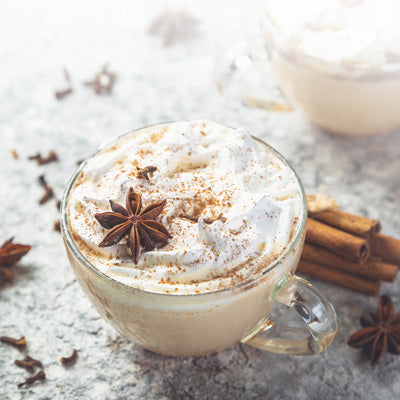Chai Tea Delights: Exploring Flavors and Caffeine Content
Posted by JESSIE X

If you've ever savoured chai tea's rich and aromatic flavours, you're in for a delightful journey into its world of taste and caffeine content. Chai tea, often referred to as masala chai, is a beloved beverage originating from India.
It's cherished for its warming spices, captivating aroma, and unique flavour profile. In this article, we'll not only explore the exquisite flavours of chai tea but also delve into the caffeine content and factors influencing it.
What is Chai Tea?
Chai tea, often simply referred to as "chai," is a traditional Indian tea that combines black tea with a blend of aromatic spices and herbs. The word "chai" actually means "tea" in Hindi, so when we say "chai tea," we're technically saying "tea tea." But no matter how you say it, one thing is clear: chai tea is all about flavour and aroma.
What Does Chai Tea Taste Like?
Chai tea is a symphony of flavours. Its taste is a harmonious blend of the earthy richness of black tea and the warm, aromatic notes of spices. The spices add complexity and depth to the tea, creating a drink that is both bold and comforting. Chai tea can be described as:
Spicy: The spices in chai, such as cinnamon and cloves, provide a warm, spicy kick.
Sweet: Many chai recipes include sweeteners like honey or sugar, which balance out the spiciness with a touch of sweetness.
Creamy: Chai is often enjoyed with milk or alternatives like soy milk, creating a creamy and luscious texture.
Aromatic: The fragrance of chai is tantalizing, with the spices releasing their enticing scents as the tea steeps.
Chai Tea: A Brief History
The history of chai tea is intertwined with the rich cultural tapestry of India. Chai has been consumed in India for centuries, with its origins dating back to ancient Ayurvedic practices. Originally, it was a spiced herbal concoction used for its medicinal properties.
Chai gained popularity during British colonial rule in India when the British began adding milk and sugar to their tea. This marked the transformation of chai from a traditional herbal remedy to the beloved, spiced tea we know today.
In recent decades, chai has become a global sensation, evolving into various forms like chai lattes and chai-flavored desserts.
Chai Tea Nutrition
Here's a glimpse of the nutritional profile of a typical cup of chai tea:
- Calories: Approximately 50-60 calories per 8-ounce cup (without added sweeteners)
- Carbohydrates: 10-15 grams (may vary based on sweeteners used)
- Fat: 1-2 grams (if prepared with milk)
- Protein: 2-3 grams (if prepared with milk)
- Fiber: Minimal
Remember that these values can vary based on the recipe and the additions you make to your chai tea.
Chai Tea Varieties
Chai tea comes in various forms, each offering a distinct taste:
Traditional Chai:
This classic blend features black tea leaves, and spices, and often includes milk and sweeteners like brown sugar. It's the heartwarming masala chai you might find in Indian households.
Chai Tea Bags:
For convenience, chai is available in tea bags, allowing you to enjoy the same flavours without the fuss of measuring and steeping.
Chai Tea Blends:
Some chai blends incorporate green tea as a base instead of black tea, offering a lighter, slightly grassy note that complements the spices.
Homemade Chai:
Craft your chai by mixing black tea leaves or tea bags with a spice mixture of your choice. This allows you to tailor the flavour to your preference.
Chai Tea Latte
A chai tea latte is a creamier and milder version of chai tea. It's made by adding steamed milk to brewed chai tea. This results in a smoother and slightly sweet flavour, making it a favourite choice at coffee shops and cafes.
Chai Tea Vanilla
Chai tea with vanilla is a delightful twist that adds a hint of sweetness and a touch of exotic flavour. Vanilla complements the spices in chai tea, creating a harmonious blend of tastes.
Chai Tea Sugar-Free
For those watching their sugar intake, you can still enjoy chai tea by opting for a sugar-free version. Simply skip the sugar or use a natural sugar substitute like stevia.
Chai Tea Matcha
Chai tea matcha is a fusion of two beloved beverages: chai tea and matcha green tea. This unique combination offers the best of both worlds - the spiciness of chai and the earthy goodness of matcha.
Chai Tea Organic and Loose Leaf
If you prefer a more natural and eco-friendly option, you can opt for organic chai tea made from high-quality ingredients. Loose-leaf chai tea allows you to customize your spice level and blend.
Understanding Chai Tea's Caffeine Content
Now, let's address a common question: Does chai tea have caffeine? The answer is yes, but the caffeine content varies depending on several factors, including the type of tea used as a base and the brewing method.
Chai tea typically contains black tea as its base, which naturally contains caffeine. However, the caffeine content in chai tea is generally lower than in a plain cup of black tea. On average, an 8-ounce cup of chai tea contains about 30-50 milligrams of caffeine, while a cup of black tea contains around 40-70 milligrams.
If you're looking to reduce your caffeine intake, you can opt for decaffeinated chai tea or herbal chai blends, which are caffeine-free.
Influential Factors
Several factors affect the caffeine content in your cup of chai:
- Leaf Size: Chai is typically made using broken-leaf black tea, which has a higher caffeine content compared to full-leaf varieties.
- Tea Varietal: Chai blends often use Indian black tea, derived from the camellia sinensis var. assamica varietal, known for having slightly higher caffeine levels.
- Water Temperature: Chai requires boiling water (around 212 degrees Fahrenheit). Hotter water extracts more caffeine from the tea leaves.
- Steep Time: A standard steeping time of four to five minutes extracts more caffeine from the black tea. A shorter steeping time results in lower caffeine levels.
- Ratio of Tea to Other Ingredients: The more black tea leaves relative to other ingredients like spices and milk, the higher the caffeine content in your chai.
Chai Tea Beyond Caffeine
Chai tea offers more than just a caffeine boost. Its blend of spices contributes to potential health benefits. Ginger, for instance, may help with digestion, and cardamom is believed to have properties that aid in reducing inflammation.
Moreover, chai tea can be enjoyed with or without milk and sugar, making it versatile to suit various dietary preferences and flavour profiles. Whether you prefer a traditional cup of chai or a modern twist like a chai tea latte, there's a chai variation for everyone.
Chai Recipes: How to Make the Perfect Cup
If you're wondering how to make a delicious cup of chai tea, we've got a simple chai recipe for you to follow:
Ingredients:
- 1 cup of water
- 1 cup of whole milk (you can use almond milk for a dairy-free option)
- 2-3 teaspoons of loose-leaf chai tea or 1 chai tea bag
- Sugar or a sugar-free sweetener (optional)
- Spices: cinnamon sticks, green cardamom pods, ginger, cloves, and black pepper (adjust to taste)
Instructions:
- Pour water into a pot and add the loose-leaf tea or tea bag.
- Add your choice of spices (you can customize the spice blend to your preference).
- Bring the water to a boil, then reduce the heat and let it simmer for 5-10 minutes.
- Add milk and sweetener if desired, and bring the mixture to a simmer again.
- Strain the chai tea into a cup and enjoy!
Final Thoughts
Chai tea is not just a beverage; it's an experience. It tantalizes your senses with its aromatic spices, comforts you with its warmth, and offers a gentle caffeine boost to kickstart your day. Whether you enjoy it as a chai tea latte, experiment with different blends, or incorporate it into your culinary creations, chai is a celebration of flavour and culture.
So go ahead, savour a cup of chai, and let its enchanting flavours transport you to distant lands and times, one sip at a time.
SHARE:

AUSTRALIA'S FINEST LOOSE LEAF TEAS
Explore Australia's largest selection of Premium Teas & All-Natural Organic Herbal Blends.


